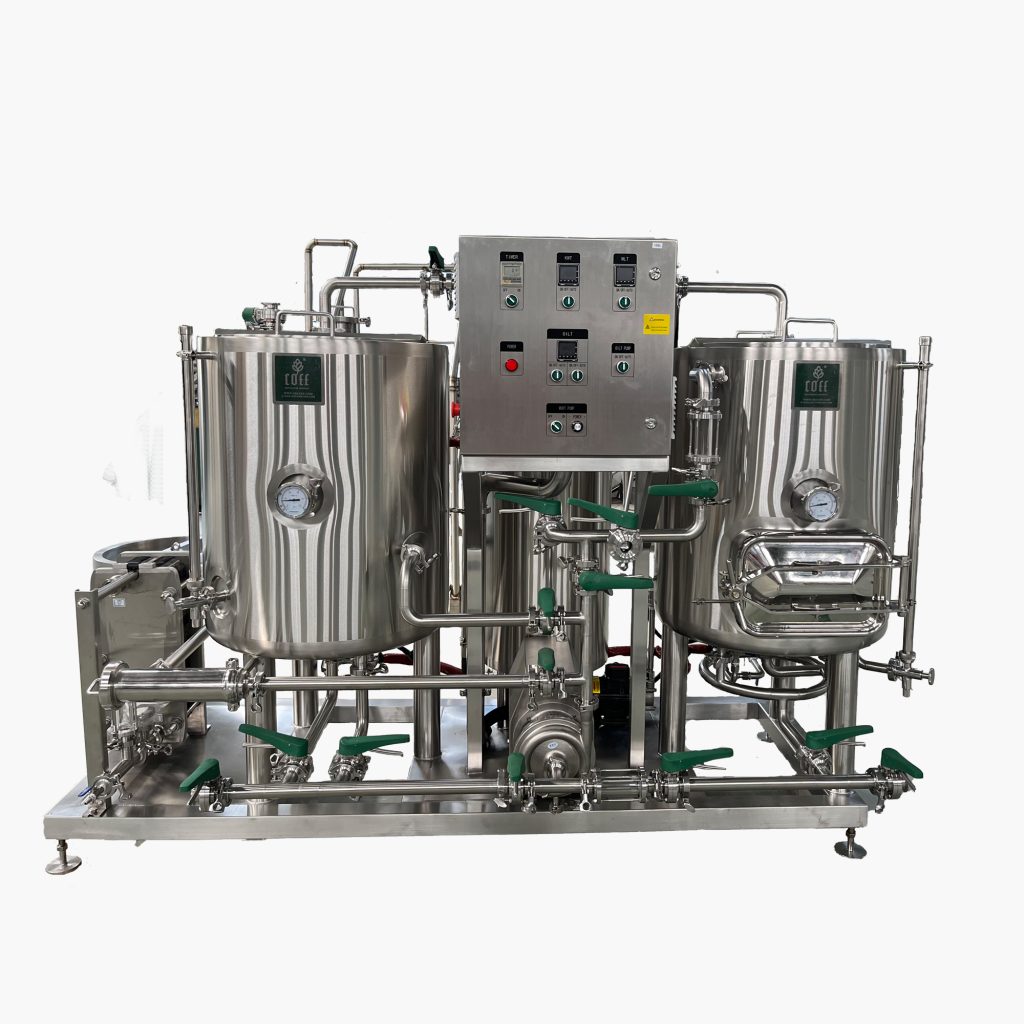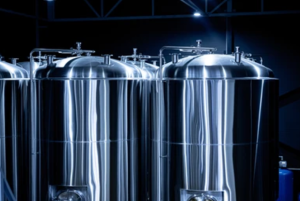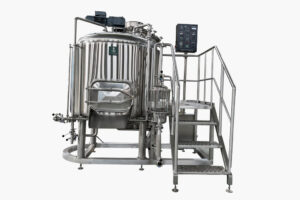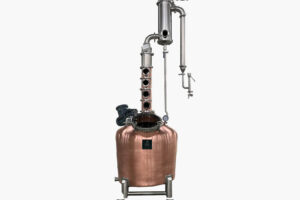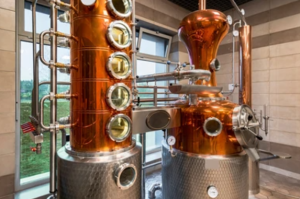COPYRIGHT © 2022 NingBo COFF Machinery Co, ltd. ALLE RECHTE VORBEHALTEN
Menü
Kategorien
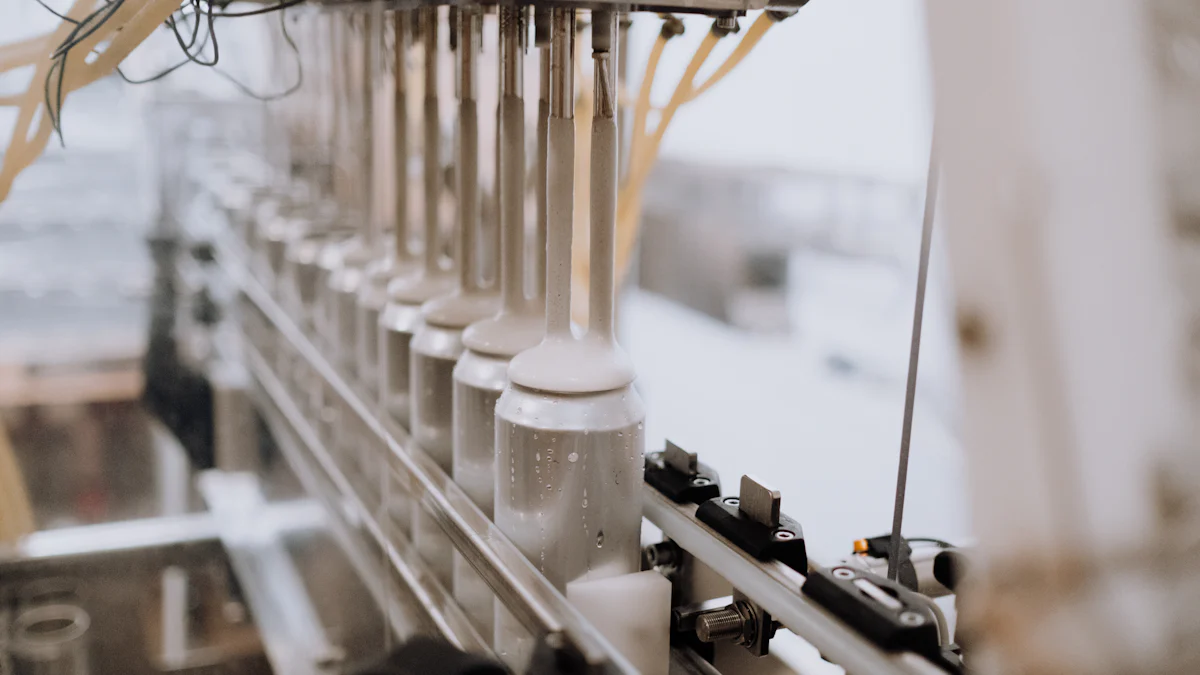
Bier-Technik spielt bei der modernen Bierherstellung eine entscheidende Rolle. Sie können sehen, wie sie sowohl die Bierqualität als auch die Produktionseffizienz verbessert. Innovationen wie die Thermometer und HydrometerJahrhundert eingeführt wurde, revolutionierte das Brauen durch die Verbesserung von Effizienz und Dämpfung. Heute gehen die Fortschritte mit Systemen wie gewichtsbezogene Überwachung für die Gärung. Diese Innovationen gewährleisten, dass Sie ein Bier von gleichbleibend hoher Qualität genießen können. Während sich die Brauindustrie weiterentwickelt, bleibt die Technik das Herzstück, das Verbesserungen vorantreibt und dafür sorgt, dass jeder Schluck Ihren Erwartungen entspricht.
Wichtigste Erkenntnisse
- Die Biertechnik ist für die Verbesserung der Qualität und der Effizienz der Bierherstellung von entscheidender Bedeutung, um ein gleichbleibend hochwertiges Produkt zu gewährleisten.
- Wenn Sie den Brauprozess - vom Mälzen bis zur Verpackung - verstehen, können Sie die Handwerkskunst hinter jedem Bier schätzen.
- Innovationen wie Temperaturkontrollsysteme und Fermentationsmodelle optimieren die Brauereibedingungen, was zu besserem Geschmack und höherer Konsistenz führt.
- Automatisierung und Robotik rationalisieren die Abläufe, reduzieren manuelle Aufgaben und minimieren Fehler, was die Produktionseffizienz insgesamt steigert.
- Nachhaltige Braupraktiken wie Wassereinsparung und Abfallreduzierung werden immer wichtiger, um die Umweltbelastung zu minimieren.
- Der Einsatz fortschrittlicher Technologien und Datenanalysen kann Ihnen helfen, fundierte Entscheidungen zu treffen und sowohl die Qualität als auch die Nachhaltigkeit Ihrer Bierproduktion zu verbessern.
- Das Gleichgewicht zwischen traditionellen Brauereimethoden und modernen Innovationen ist der Schlüssel zur Herstellung außergewöhnlicher Biere, die ihr Erbe ehren und gleichzeitig den Geschmack von heute treffen.
Überblick über den Prozess des Bierbrauens
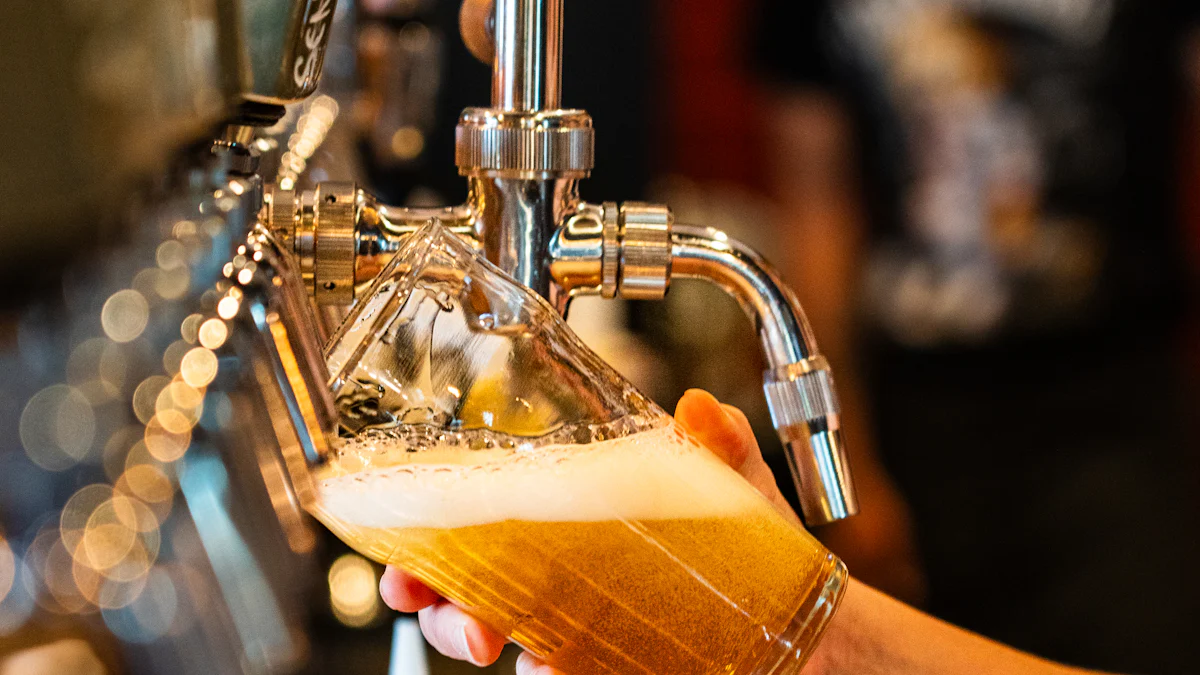
Wenn Sie den Prozess des Bierbrauens verstehen, können Sie die Handwerkskunst, die hinter jedem Schluck steckt, besser einschätzen. Dieser Prozess umfasst mehrere wichtige EtappenJeder dieser Schritte trägt zur Qualität und zum Geschmack des Endprodukts bei. Schauen wir uns die ersten Schritte an: Mälzen, Maischen und Kochen.
Mälzerei
Mit dem Mälzen beginnt die Reise des Brauens. Man beginnt mit Gerste, die eingeweicht wird, um Enzyme zu aktivieren. Diese Enzyme spielen eine entscheidende Rolle bei der Umwandlung von Stärke in vergärbaren Zucker. Diese Umwandlung ist von entscheidender Bedeutung, da sie die Voraussetzungen für die Gärung schafft, bei der die Hefe diese Zucker später in Alkohol umwandelt. Der Mälzungsprozess bereitet nicht nur das Getreide vor, sondern beeinflusst auch die Farbe und das Geschmacksprofil des Bieres.
Einmaischen
Als Nächstes geht es ans Pürieren. In diesem Schritt mischen Sie die gemälzte Körner mit heißem Wasser. Durch diese Mischung entsteht eine Maische, die es den Enzymen ermöglicht, die Stärke weiter in Zucker aufzuspalten. Die Temperatur und die Dauer des Maischens können den Körper und die Süße des Bieres erheblich beeinflussen. Durch eine sorgfältige Kontrolle dieser Faktoren stellen Sie sicher, dass die resultierende Würze bzw. das nicht vergorene Bier die gewünschten Eigenschaften aufweist.
Kochend
Das Kochen der Würze ist eine entscheidende Phase im Brauprozess. In dieser Phase fügen Sie den Hopfen hinzu, der dem Bier Bitterkeit, Aroma und Geschmack verleiht. Das Kochen dient auch dazu, die Würze zu pasteurisieren und unerwünschte Mikroorganismen abzutöten. Die Länge des Kochvorgangs und der Zeitpunkt der Hopfenzugabe können variieren, so dass Sie ein Bier mit einzigartigen Geschmacksprofilen herstellen können. Dieser Schritt ist entscheidend für die Stabilität und Qualität des Biers.
Wenn Sie diese grundlegenden Schritte verstehen, erhalten Sie einen Einblick in die Art und Weise, wie jede Stufe des Bierbrauprozesses das Endprodukt beeinflusst. Vom Mälzen bis zum Kochen beeinflusst jeder Schritt den Geschmack, das Aroma und die Gesamtqualität des Biers.
Gärung
Die Gärung ist ein zentraler Schritt im Bierbrauprozess. Dabei wird der gekühlten Würze Hefe zugesetzt, die eine Umwandlung des Zuckers in Alkohol und Kohlendioxid einleitet. Bei diesem Gärungsprozess entsteht nicht nur Alkohol, sondern er trägt auch zum Geschmack und zum Aroma des Bieres bei. Sie können die Temperatur und die Dauer der Gärung steuern, um das endgültige Geschmacksprofil zu beeinflussen. Durch die Steuerung dieser Faktoren stellen Sie sicher, dass das Bier die gewünschten Eigenschaften entwickelt, egal ob es sich um ein knackiges Lagerbier oder ein kräftiges Ale handelt.
Konditionierung
Sobald die Gärung abgeschlossen ist, geht man zur Lagerung über. In diesem Schritt kann das Bier reifen, wodurch sich seine Aromen verbessern und scharfe Noten abgemildert werden. Während der Konditionierung können Sie feststellen, dass das Bier klarer wird, da sich die Sedimente absetzen. Diese Phase kann je nach Bierstil zwischen einigen Wochen und mehreren Monaten dauern. Indem Sie das Bier konditionieren lassen, sorgen Sie für einen ausgewogenen und raffinierten Geschmack, der zum Verzehr bereit ist.
Verpackung
Der letzte Schritt im Brauprozess ist die Verpackung. Sie füllen das konditionierte Bier in Flaschen, Dosen oder Fässer ab und bereiten es für den Vertrieb und den Verbrauch vor. Beim Verpacken können Sie das Bier mit Kohlensäure versetzen, damit es besser sprudelt. Die richtige Verpackung sorgt dafür, dass das Bier seine Qualität und Frische behält, bis es zu Ihnen kommt. Ganz gleich, ob Sie eine Flasche oder eine Dose bevorzugen, dieser Schritt garantiert, dass das Bier seinen beabsichtigten Geschmack und sein Aroma beibehält.
Technische Innovationen beim Bierbrauen
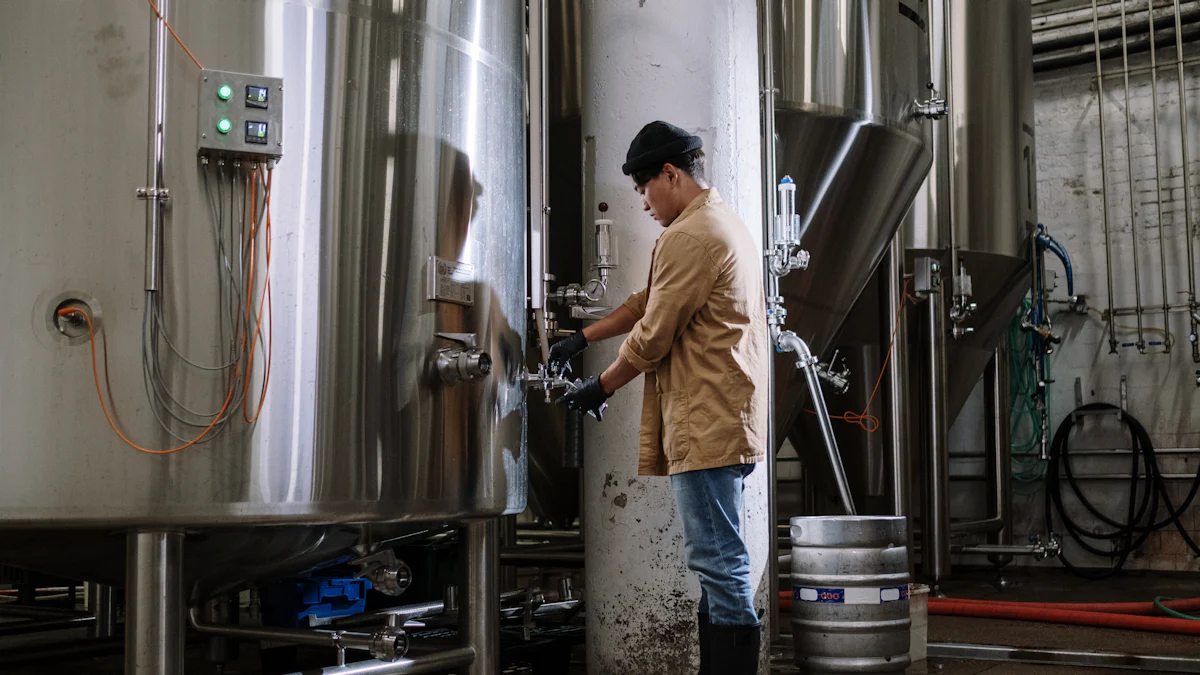
In der Welt der Bierherstellung spielen Innovationen eine entscheidende Rolle bei der Verbesserung des Brauprozesses. Diese Fortschritte sorgen dafür, dass jede Charge Bier den Anforderungen hohe Qualitätsstandards und Konsistenz. Sehen wir uns einige wichtige Innovationen an, die die Braulandschaft verändert haben.
Systeme zur Temperaturkontrolle
Temperaturregelungssysteme sind beim Bierbrauen unverzichtbar. Sie ermöglichen es, die Temperaturen in den verschiedenen Phasen des Brauprozesses genau einzuhalten. Diese Präzision ist entscheidend, da die Temperatur die Aktivität von Enzymen und Hefe beeinflusst. Durch die Kontrolle der Temperatur wird sichergestellt, dass der Gärungsprozess reibungslos abläuft und ein Bier mit dem gewünschten Geschmack und Alkoholgehalt entsteht. Moderne Systeme verwenden Sensoren und Automatisierungssysteme zur Überwachung und Anpassung der Temperatur und sorgen so für eine gleichbleibende Qualität der einzelnen Chargen.
Modellierung der Gärung
Die Modellierung der Gärung stellt einen bedeutenden Fortschritt in der Bierherstellung dar. Dabei werden mathematische Modelle verwendet, um den Gärungsprozess vorherzusagen und zu steuern. Wenn Sie die Beziehung zwischen Hefezellen und Gärung verstehen, können Sie die Bedingungen optimieren, um die gewünschten Biermerkmale zu erzielen. Diese Modellierung hilft Ihnen, die verzögerte, exponentielle und stationäre Phase der Gärung zu steuern und sicherzustellen, dass die Hefe optimal arbeitet. Mit einer genauen Modellierung können Sie Bier mit gleichbleibendem Geschmack und gleichbleibender Qualität herstellen.
Kühltechniken
Kühltechniken sind für den Brauprozess von entscheidender Bedeutung. Nach dem Kochen müssen Sie die Würze schnell abkühlen, um sie für die Gärung vorzubereiten. Eine schnelle Abkühlung verhindert, dass unerwünschte Mikroorganismen die Qualität des Bieres beeinträchtigen. Moderne Kühlsysteme verwenden effiziente Wärmetauscher, um die gewünschte Temperatur schnell zu erreichen. Diese Systeme erhöhen nicht nur die Stabilität des Bieres, sondern verbessern auch die Energieeffizienz des Brauprozesses. Durch den Einsatz wirksamer Kühltechniken stellen Sie sicher, dass das Bier seinen beabsichtigten Geschmack und sein Aroma behält.
Simulation und Technologie beim Bierbrauen
Im Bereich der Bierherstellung, Simulation und Technologie sind zu unverzichtbaren Werkzeugen geworden. Sie verbessern den Brauprozess, indem sie für Präzision und Effizienz sorgen. Sehen wir uns an, wie diese Fortschritte die Branche prägen.
Prozess-Simulationen
Prozesssimulationen ermöglichen es Ihnen, den Brauprozess zu visualisieren und zu optimieren, bevor die eigentliche Produktion beginnt. Mithilfe von Computermodellen können Sie vorhersagen, wie sich verschiedene Variablen auf das Endprodukt auswirken werden. Dieser Ansatz hilft Ihnen, potenzielle Probleme zu erkennen und notwendige Anpassungen vorzunehmen. Simulationen können beispielsweise aufzeigen, wie sich Änderungen der Temperatur oder des Verhältnisses der Zutaten auf den Geschmack und die Qualität des Bieres auswirken. Mit diesen Erkenntnissen können Sie sicherstellen, dass jede Charge Ihren hohen Ansprüchen genügt.
Automatisierung und Robotik
Automatisierung und Robotik haben die Brauereiindustrie revolutioniert. Diese Technologien rationalisieren die Abläufe und verringern den Bedarf an manuellen Eingriffen. Automatisierte Systeme erledigen Aufgaben wie das Mischen von Zutaten, die Überwachung der Gärung und die Verpackung mit Präzision. Roboter steigern die Effizienz, indem sie sich wiederholende Aufgaben schnell und genau ausführen. Diese Automatisierung beschleunigt nicht nur die Produktion, sondern minimiert auch menschliche Fehler und gewährleistet eine gleichbleibende Bierqualität. Wenn Sie sich diese Technologien zu eigen machen, können Sie sich bei Ihren Brauereibemühungen auf Innovation und Kreativität konzentrieren.
Datenanalyse
Data analytics plays a crucial role in modern beer production. By collecting and analyzing data from various stages of the brewing process, you gain valuable insights into performance and quality. Analytics help you track key metrics such as fermentation rates, temperature fluctuations, and ingredient usage. This information allows you to make informed decisions and optimize processes. For example, data analytics can identify trends and patterns that lead to improved efficiency and reduced waste. By harnessing the power of data, you enhance both the quality and sustainability of your beer production.
The Role of COFF in Brewing Innovation
In the ever-evolving world of beer production, COFF stands at the forefront of brewing innovation. As a leader in the industry, COFF provides cutting-edge solutions that enhance both the quality and efficiency of beer production. By integrating advanced technologies, COFF ensures that you enjoy a superior beer experience.
COFF’s Engineering Solutions
COFF offers a range of engineering solutions that revolutionize the brewing process. These solutions focus on precision and control, ensuring that each batch of beer meets the highest standards.
Systeme zur Temperaturkontrolle: COFF’s systems allow you to maintain precise temperatures throughout the brewing process. This control is crucial for enzyme activity and yeast performance, directly impacting beer quality.
Simulation Technology: By utilizing simulation technology, COFF enables you to model and predict fermentation outcomes with precision. This approach ensures consistent flavor and quality in every batch.
Automatisierung und Robotik: COFF integrates automation and robotics to streamline operations. These technologies reduce manual intervention, enhancing efficiency and minimizing errors.
COFF’s Impact on Quality and Efficiency
COFF’s innovations significantly impact both the quality and efficiency of beer production. By adopting COFF’s solutions, you can achieve remarkable improvements in your brewing operations.
Enhanced Beer Quality: With precise control over the brewing process, COFF ensures that each beer maintains its intended flavor and aroma. This consistency guarantees a high-quality product every time.
Increased Efficiency: COFF’s automation and data analytics optimize the brewing process, reducing waste and improving resource utilization. This efficiency translates to cost savings and a more sustainable production model.
By choosing COFF, you align yourself with a brand committed to excellence and innovation in the brewing industry. COFF’s engineering solutions not only elevate your beer quality but also enhance the overall efficiency of your operations.
Future Trends in Beer Engineering
The future of beer engineering promises exciting advancements that will shape the industry. As you explore these trends, you’ll discover how they enhance both the quality and sustainability of beer production.
Sustainable Brewing Practices
Sustainability is becoming a cornerstone of modern brewing. You can expect breweries to adopt practices that minimize environmental impact. Here are some key sustainable practices:
Wassereinsparung: Breweries are implementing systems to reduce water usage. By recycling water and using efficient cleaning processes, you help conserve this vital resource.
Energie-Effizienz: Many breweries are investing in renewable energy sources. Solar panels and wind turbines power operations, reducing reliance on fossil fuels.
Waste Reduction: Breweries are finding innovative ways to repurpose waste. Spent grains become animal feed, and carbon dioxide from fermentation is captured and reused.
These practices not only benefit the environment but also improve the overall efficiency of beer production. By embracing sustainability, you contribute to a greener future for the brewing industry.
Advanced Brewing Technologies
Technological advancements continue to revolutionize beer production. As you delve into these innovations, you’ll see how they enhance precision and consistency in brewing.
Automated Control Systems: Automation ensures consistent brewing outcomes. With precise control over temperature and timing, you achieve repeatable results in every batch.
Modellierung der Gärung: Using mathematical models, you can predict fermentation outcomes with accuracy. This technology helps you maintain consistent quality and flavor in your beer.
Process Optimization: Process engineers optimize brewing operations to maximize efficiency. By analyzing data and refining processes, you ensure high-quality beer production.
These technologies not only streamline operations but also elevate the quality of your beer. By integrating advanced systems, you stay at the forefront of brewing innovation.
Challenges in Beer Engineering
In the dynamic world of beer production, you face several challenges that require a delicate balance between tradition and innovation. These challenges not only test your skills but also push the boundaries of what is possible in brewing.
Balancing Tradition and Innovation
As a brewer, you often find yourself at the crossroads of tradition and innovation. The rich history of beer brewing, with its roots stretching back centuries, offers a wealth of traditional methods and recipes. For instance, the introduction of hops in northern Europe during the 13th century significantly improved the brewing process and beer quality. This historical advancement led to increased consumption and a concentration of the brewing industry.
However, modern advancements present new opportunities. The explosion of knowledge and technical advancements in homebrewing has given you access to the latest research. You can now estimate bitterness, color, and infusion temperatures with greater accuracy. The expansion of all-grain brewing techniques further exemplifies how innovation can enhance traditional practices.
To successfully balance these elements, you must respect the time-honored methods while embracing new technologies. This balance ensures that you produce beer that honors its heritage while meeting contemporary expectations.
Regulatory and Environmental Concerns
Navigating regulatory and environmental concerns is another significant challenge in beer engineering. As a brewer, you must adhere to strict regulations that govern everything from ingredient sourcing to production processes. These regulations ensure the safety and quality of your beer but can also impose limitations on your operations.
Environmental concerns add another layer of complexity. The brewing process is resource-intensive, requiring large volumes of water and energy. You must find ways to minimize waste and reduce your environmental footprint. Sustainable practices, such as water conservation and energy efficiency, are essential in addressing these concerns.
By staying informed about regulatory changes and adopting sustainable practices, you can overcome these challenges. This proactive approach not only ensures compliance but also contributes to a more sustainable future for the brewing industry.
The Impact of Engineering on Brewing
Beer engineering significantly influences the brewing process, enhancing quality, efficiency, and innovation. As you delve into this section, you’ll discover how engineering shapes the beer you enjoy.
Enhancing Quality
Engineering plays a pivotal role in elevating beer quality. By implementing precise temperature control systems, you ensure that the fermentation process occurs under optimal conditions. This precision allows yeast to perform efficiently, resulting in a beer with consistent flavor and aroma. Additionally, advanced filtration technologies remove impurities, enhancing clarity and taste. With these engineering advancements, you can produce a beer that meets high-quality standards every time.
Improving Efficiency
Efficiency in brewing is crucial for meeting demand and reducing costs. Engineering innovations streamline the beer brewing process, allowing you to produce more beer with fewer resources. Automation and robotics handle repetitive tasks, such as ingredient mixing and packaging, with speed and accuracy. This automation reduces human error and increases production rates. Furthermore, energy-efficient systems minimize resource consumption, making the brewing process more sustainable. By embracing these technologies, you optimize operations and improve overall efficiency.
Driving Innovation
Innovation drives the evolution of the brewing industry. Beer engineering introduces new technologies that revolutionize traditional methods. For instance, fermentation modeling uses mathematical models to predict outcomes, allowing you to experiment with different flavors and styles. This innovation opens up possibilities for creating unique beers that cater to diverse tastes. Additionally, simulation technology enables you to visualize and refine the brewing process before production begins. By fostering innovation, you stay ahead in the competitive beer market.
“Expanding opportunities for California craft breweries by allowing beer manufacturers to apply for a Beer Caterer’s Permit starting January 1, 2025.” This legislative change highlights the growing recognition of innovation in the brewing industry.
Engineering profoundly impacts the beer brewing process, enhancing both quality and efficiency. You see how innovations like automation and simulation technology drive improvements, ensuring each batch meets high standards. The future holds exciting potential for further advancements, promising even greater precision and sustainability in beer production. COFF plays a pivotal role in this evolution, offering cutting-edge solutions that elevate your brewing operations. By embracing these innovations, you contribute to a vibrant and dynamic industry, continually pushing the boundaries of what’s possible in beer production.
FAQ
What is beer engineering?
Beer engineering involves applying engineering principles to the brewing process. It enhances beer quality and production efficiency. By using technology and innovation, you can create consistent and high-quality brews.
How does temperature control affect brewing?
Temperature control is crucial in brewing. It influences enzyme activity and yeast performance. By maintaining precise temperatures, you ensure optimal fermentation, resulting in a beer with the desired flavor and alcohol content.
Why is fermentation modeling important?
Fermentation modeling uses mathematical models to predict and control the fermentation process. This helps you optimize conditions for yeast performance, ensuring consistent beer quality and taste.
What role does automation play in brewing?
Automation streamlines brewing operations. It handles tasks like ingredient mixing and packaging with precision. This reduces human error and increases production efficiency, allowing you to focus on creativity and innovation.
How does COFF contribute to brewing innovation?
COFF provides cutting-edge engineering solutions for the brewing industry. Their systems enhance temperature control, simulation technology, and automation. By choosing COFF, you ensure high-quality and efficient beer production.
What are sustainable brewing practices?
Sustainable brewing practices minimize environmental impact. They include water conservation, energy efficiency, and waste reduction. By adopting these practices, you contribute to a greener future for the brewing industry.
How do simulations improve the brewing process?
Simulations allow you to visualize and optimize the brewing process before production. They help identify potential issues and make necessary adjustments, ensuring each batch meets high standards of quality.
What challenges do brewers face in balancing tradition and innovation?
Balancing tradition and innovation involves respecting time-honored methods while embracing new technologies. This ensures you produce beer that honors its heritage while meeting contemporary expectations.
How can data analytics enhance beer production?
Data analytics provides insights into brewing performance and quality. By tracking key metrics, you can make informed decisions and optimize processes, leading to improved efficiency and reduced waste.

